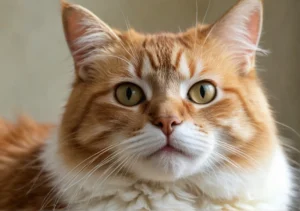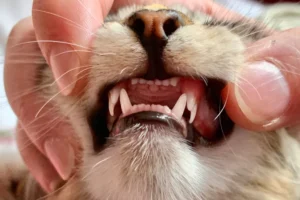Cats are known for their sharp teeth and agile paws, but what happens when their gums start to enlarge? It can be a concerning sight for any cat owner. In this blog post, we will explore the reasons behind why a cat’s gums may enlarge and what steps you can take to address this issue.
Answer: Enlarged cat gums can be caused by a variety of factors, including dental disease, inflammation, infections, or even tumors. It’s important to consult with a veterinarian to properly diagnose the underlying cause and determine the appropriate treatment.
Signs and Symptoms of Enlarged Gums
If you notice your furry feline friend experiencing any of the following signs and symptoms, it may indicate that their gums are enlarged:
- Swelling: Keep an eye out for any unusual swelling in your cat’s gums. This could be a clear indicator that something is not quite right in their mouth.
- Redness: Healthy gums should be a nice pink color. If you see redness, it could be a sign of inflammation or infection.
- Bleeding: If you spot blood when your cat chews on their favorite toy or while eating, this could be a sign of gum issues that need addressing.
- Changes in Eating Habits: Is your cat suddenly avoiding their favorite food or struggling to eat? Changes in eating habits can be a clear indicator of oral health problems.
If you notice any of these signs, it’s important to consult with your veterinarian to determine the underlying cause of your cat’s enlarged gums.
Common Causes of Enlarged Cat Gums
There are various reasons why a cat’s gums may become enlarged, and here are a few common culprits to watch out for:
- Periodontal Disease: This is one of the most common reasons for enlarged gums in cats. Plaque buildup can lead to gum inflammation and infection if not properly addressed.
- Gingivitis: Just like in humans, cats can also suffer from gingivitis, which causes red, swollen gums and bad breath.
- Stomatitis: A more severe condition, stomatitis is a painful inflammation of the mouth and gums that can result in significant enlargement and discomfort for your furry friend.
- Other Oral Health Issues: From abscesses to oral tumors, there are a variety of other oral health problems that can lead to enlarged gums in cats.
Remember, proper dental care and regular check-ups are key to preventing and addressing issues with your cat’s oral health. If you suspect your cat’s gums are enlarged, don’t delay in seeking professional veterinary care to ensure they receive the treatment they need.
Diagnostic Process
So, your furball has some serious gum swelling going on, huh? Well, when it comes to figuring out what’s causing those big ol’ gums, veterinarians have a few tricks up their sleeves. They might start with a nose-to-tail physical exam to check for any other issues. Then, they could take a peek inside your cat’s mouth with some dental X-rays to see if there are any hidden problems lurking beneath the surface. To top it all off, they might even run some lab tests to get to the bottom of things. It’s like solving a mystery, but with more purring.
Treatment Options
Alright, let’s talk about how we can shrink those puffy gums back down to size. One popular option is a good ol’ professional dental cleaning to get rid of any plaque and tartar causing the inflammation. Your vet might also prescribe some antibiotics to kick any infections to the curb. If your kitty is feeling a little sore, some pain management options can help keep them comfortable. And in more serious cases, surgical intervention might be necessary to get those gums back in tip-top shape.
Additional Insight: Natural Remedies
Hey, did you know that there are some natural remedies that can help soothe your cat’s swollen gums? Things like coconut oil, aloe vera gel, or even chamomile tea can provide some relief. Just make sure to check with your vet before trying any home remedies to make sure they’re safe for your furry friend.
Preventative Care
Understanding the importance of dental care for your furry friend can make a huge difference in keeping those gums in check. By taking proactive steps, such as regular teeth brushing and providing dental treats, you can significantly reduce the risk of your cat experiencing enlarged gums. Annual veterinary check-ups are also crucial to catch any oral health issues early on and prevent them from progressing. So, stay on top of your cat’s dental hygiene to keep those gums healthy and happy!
Home Care Tips
When it comes to maintaining your cat’s oral hygiene at home, there are a few simple yet effective tips to keep in mind. First off, get into the habit of brushing your cat’s teeth regularly. Yes, you heard that right! Dental treats can also help in keeping those teeth clean. And don’t forget about those annual vet check-ups – they’re like the cherry on top when it comes to ensuring your cat’s oral health is in tip-top shape. By staying consistent with these home care tips, you’ll be well on your way to preventing any gum issues from creeping up.
Additional Unique Insight: Did you know that incorporating dry food into your cat’s diet can also help maintain good oral health? The crunchy texture of dry kibble can aid in removing plaque and tartar buildup, keeping those gums healthy and happy.
Remember, a little effort goes a long way when it comes to taking care of your cat’s dental health. So, don’t wait until those gums start causing trouble – start implementing these preventative measures today!
Why Do Cat Gums Enlarge?
If you’ve noticed your cat’s gums looking bigger than usual, it could be a sign of underlying health issues. One common reason for enlarged cat gums is a condition called gingivitis, which is the inflammation of the gums. This can be caused by a buildup of plaque and tartar on your cat’s teeth, leading to bacterial overgrowth and irritation of the gums. In more severe cases, gingivitis can progress to periodontal disease, which can cause swelling and redness in the gums. Other potential causes of enlarged cat gums include dental infections, oral tumors, or even systemic diseases like kidney disease or diabetes.
In some cases, enlarged cat gums can also be a result of a condition called stomatitis, which is a severe and painful inflammation of the mouth and gums. Stomatitis can make it uncomfortable for your cat to eat, groom, or even open its mouth properly. If you suspect that your cat’s gums are enlarged, it’s essential to consult with a veterinarian for a proper diagnosis and treatment plan.
When to Seek Veterinary Help
If you notice that your cat’s gums are significantly larger than normal, or if you observe other concerning symptoms like bad breath, drooling, or reluctance to eat, it’s time to seek professional help from a veterinarian. Your vet will perform a thorough examination of your cat’s mouth, including dental x-rays if necessary, to determine the underlying cause of the gum enlargement. Depending on the diagnosis, treatment options may include professional dental cleaning, antibiotics, pain management, or even surgery in severe cases. Early intervention is crucial in preventing further complications and improving your cat’s oral health.
When you visit the vet, be prepared to discuss your cat’s eating habits, any recent changes in behavior, and details about their overall health. Your vet may also recommend regular dental check-ups and at-home dental care to prevent future issues with your cat’s oral health. Remember, your furry friend relies on you to keep their teeth and gums healthy, so don’t hesitate to schedule a veterinary appointment if you have concerns about their dental health.
Fun Facts About Cat Dental Health
- Cats Have 30 Teeth: Just like humans, cats have two sets of teeth in their lifetime. Kittens start with baby teeth, which eventually fall out and are replaced by permanent adult teeth, totaling 30 in all.
- Dental Disease is Common: Dental issues are one of the most common health problems in cats, with an estimated 70% of cats showing signs of dental disease by the age of three.
- Chewing Helps Clean Teeth: Chewing on dry food or dental treats can help keep your cat’s teeth clean by reducing plaque and tartar buildup. Additionally, special dental diets are available to promote oral health in cats.
- Regular Dental Care is Vital: Establishing a regular dental care routine for your cat, including daily teeth brushing and annual dental check-ups, can significantly decrease the risk of dental problems and ensure your cat’s overall well-being.
Remember to prioritize your cat’s dental health by staying alert to any signs of gum enlargement or other oral issues. By taking proactive steps to care for your cat’s teeth and gums, you can help them enjoy a lifetime of good oral health and happy purrs.
Alex, a passionate animal lover, has experience in training and understanding animal behavior. As a proud pet parent to two dogs and three cats, he founded AnimalReport.net to share insights from animal experts and expand his knowledge of the animal kingdom.




